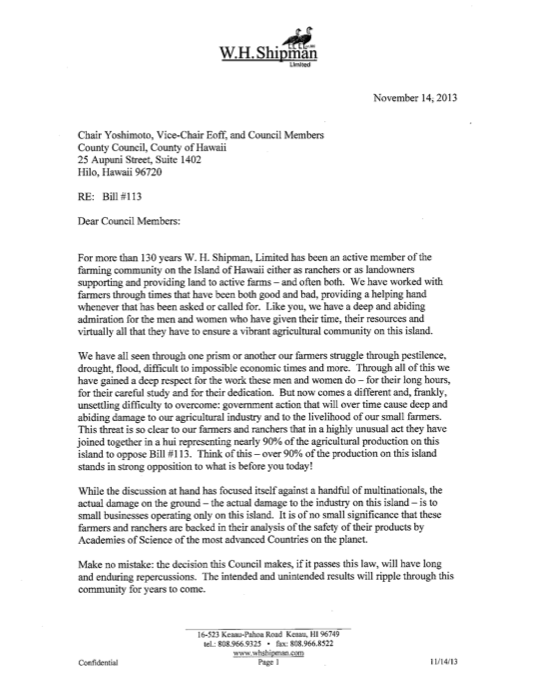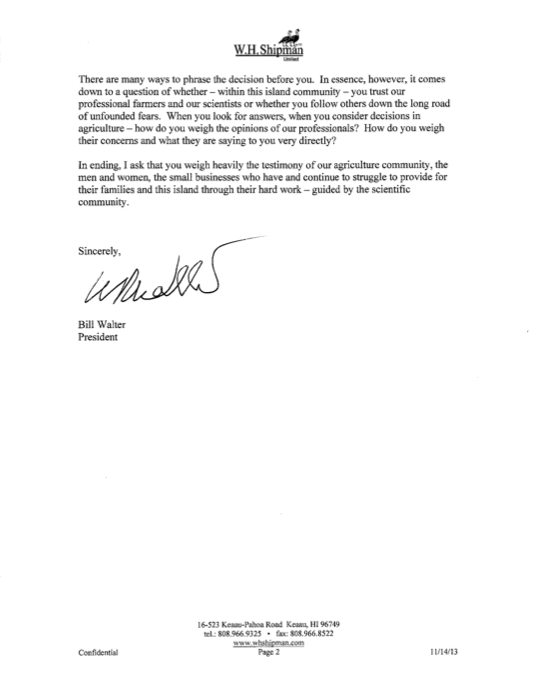Richard Ha writes:
Farmers and other Ag and business people on the Big Island are in disbelief – to put it mildly – that Mayor Kenoi signed Bill 113, the anti-GMO bill, last week, without first putting together a group to research the science and investigate the serious, unintended consequences we know will result.
But farmers are very practical and play the position that exists on the chessboard, not the position they wish they had. Most of us are moving into strategic contraction mode now.
For example, we had an application in to the USDA to dedicate 264 acres of our farm into agricultural land for perpetuity. We had been going through the vetting process over the last two years and had already been told we were among the top three state projects, as determined by a Department of Land and Natural Resources subcommittee.
I just received a letter Friday asking for more information about our application, with a comment from the Western Region director stating that our project had the highest priority.
I wrote back saying we are withdrawing our application. Nothing personal; just playing the position that now exists. Instead, we will subdivide the property so we have options as we go forward into a future that has some new uncertainties.
If there’s an upside to the mayor signing the bill, it’s that maybe now we will finally take a real look at the current Peak Oil crisis and how it affects the Big Island’s food self-sufficiency situation, and come to grips with finding long-term solutions.
Being open to safe scientific advances when needed (a.k.a. biotech or “GMO”) would have been a way to decrease our dependence on petroleum products, such as pesticides and fertilizers, and increase our island’s food self-sufficiency.
Geothermal energy is another no-brainer that will protect us from rising energy costs. Utilizing geothermal energy – which according to geophysicists will be available to us for at least 500,000 years – we can have stable electricity at an affordable price. As another benefit of geothermal, we can take the currently “curtailed” (collected but unused) electricity and make hydrogen for ground transportation; and by combining it with nitrogen in the air, we can make fertilizer that doesn’t depend on petroleum products and continue to get more and more expensive.
But Senator Ruderman doesn’t see this and wants to kill geothermal energy.
Why? Where is he steering our ship? It feels rudderless.
These are turbulent times. Former Federal Reserve Chairman Alan Greenspan was on CNN yesterday saying that despite dumping money into the economy, businesses are sitting on a lot of cash and not investing, and banks are not lending because it’s too risky.
He said that the level of uncertainty is like it was during the Great Depression. The next Fed chair will have to manage the interest rate, and too high an interest rate will roil the stock market. He said, “It’s hard to manage psychology.”
I do not see people paying attention to this, so let me extrapolate from what he’s saying: As a result, regular folk are not earning as much money. As a consequence of that, the government will not be able to tax people at a level needed to keep services going, such as maintaining roads (which, of course, requires products made from petroleum).
How far will this go on before we can no long maintain our infrastructure the way we are accustomed to, or take care of our poor people who need help?
What Alan Greenspan is talking about is serious business, and he’s certainly not the only person saying it.
This all boils down to the cost of energy, and how we utilize our resources in a smart and efficient manner.
I’ve gone to five Peak Oil conferences now, and have learned that experts there are all, consistently, saying that the net energy available to society is decreasing as it gets more difficult to get the energy. The consequence of this is less growth, which means less money for the government to perform the services we need to continue living the way we live. Where will the money come from?
Another expert who is highly respected is actury Gail Tverberg. She is as credible as anyone I’ve heard, and she too says it all boils down to the cost of energy. Not availability, nor how much oil still exists, but how much it costs to obtain it – and we all know those costs are only going higher. She writes:
Oil and other fossil fuels are unusual materials. Historically, their value to society has been far higher than their cost of extraction. It is the difference between the value to society and their cost of extraction that has helped economies around the world grow. Now, as the cost of oil extraction rises, we see this difference shrinking. As this difference shrinks, the ability of economies to grow is eroding, especially for those countries that depend most heavily on oil–Japan, Europe, and the United States. It should not be surprising if the growth of these countries slows as oil prices rise…. Read the rest
Using GMOs to help leverage our year-round growing season was a workaround, and in my opinion, it was much less risky than what Alan Greenspan, Gail Tverberg and other experts say is coming.
We need to take action and prepare for these changing conditions. If it turns out they were wrong, no harm/no foul. If they are right, using GMO's to avoid petroleum costs in fertilizer and pesticides would have helped us immensely; and using geothermal energy will improve our lifestyle measurably.
Note that I’m not just talking about this – the whole situation scared me enough that we went and put in a hydroelectric system for the farm.
This is not about the sky falling. It’s about common sense. It’s all a matter of how much risk we are willing to take.
We need to decrease our dependence on petroleum, and our energy costs. Rising electricity costs affect the price of our food, and they take away discretionary income from the rubbah slippah folks. Consumer spending makes up two-thirds of our economy.
It’s foolish for us to put our thumbs in our ears and our fingers over our eyes and sing, “La la la la la,” but that’s what seems to be going on around here.
We’d better have a clear-headed discussion about our future.


